古文称谓英译
- 格式:doc
- 大小:42.50 KB
- 文档页数:3
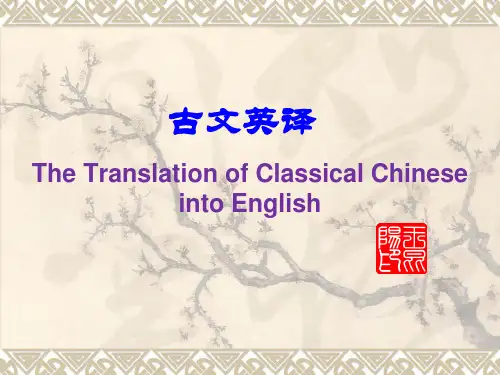
![古汉语中对人的称呼[宝典]](https://uimg.taocdn.com/f969ac1278563c1ec5da50e2524de518964bd3bb.webp)
古汉语中对人的称谓与现代汉语中对人的称谓不尽相同,阅读古诗文时要特别留意,以免误解,甚至闹出笑话。
古汉语中对人的称谓主要有以下几种类型:一、人称代词1、吾吾不能居其地(《勾践灭吴》)吾:我们。
吾与徐公孰美(《邹忌讽齐王纳谏》)吾:我。
2、余余与四人拥火以入(《游褒禅山记》)余:我。
盖余所至(《游褒禅山记》)余:我们。
3、予予独爱莲之出淤泥而不染(《爱莲说》)予:我。
4、朕回朕车以复路兮(《离骚》)朕:我,自秦始皇起专用作皇帝的自称。
5、汝因笑谓迈曰:“汝识之乎?”(《石钟山记》)汝:你。
6、尔求,无乃尔是过与?(《季氏将伐颛臾》)尔:你。
7、乃与尔三矢,尔其无忘乃父之志(《伶官传序》)尔、乃:你,第二人称代词。
8、若更若役,复若赋(《捕蛇者说》)若:你的9、二三子昔者之战也,非二三子之罪也(《勾践灭吴》)二三子:你们。
10、或或百步而后止(《寡人之于国也》)或:有人,有的人,不定代词。
二、以身份、职业作称谓1、公、侯、伯、子、男晋侯、秦伯围郑(《烛之武退秦师》)晋侯、秦伯:指晋文公和秦穆公。
春秋时期,有公、侯、伯、子、男五等爵位。
汉代封侯实际上只有王、侯二等。
王子封“王”相当于先秦的诸侯,汉代初期异姓也封王,后来“非刘氏不王”,异姓受封的通称列侯。
三国以后,历代封爵制度不尽相同,但姓封王都是一致的,异姓一般封为公、侯、伯、子、男。
晋、宋以后,爵号加“开国”字样表示尊贵,如乐安郡开国公,曲阜县开国子,称为开国爵。
2、子、臣、君子而思报父母之仇,臣而思报君之仇(《勾践灭吴》)子:儿子。
臣:臣子。
君:君主。
3、黎民黎民不饥不寒(《寡人之于国也》)黎民:百姓。
百姓的称谓:常见的有布衣、黔首、黎民(黎:众,黎民:众民)、生民、黎庶、苍生、黎元、氓等。
4、行李行李之往来,共其乏困(《烛之武退秦师》)行李:使者,即后世所说的外交使节。
5、贾人贾人夏则资皮(《勾践灭吴》)贾人:商人。
行则叫商,坐则叫贾。
6、、前马其身为夫差前马(《勾践灭吴》前马:前驱,在马前开道的人。

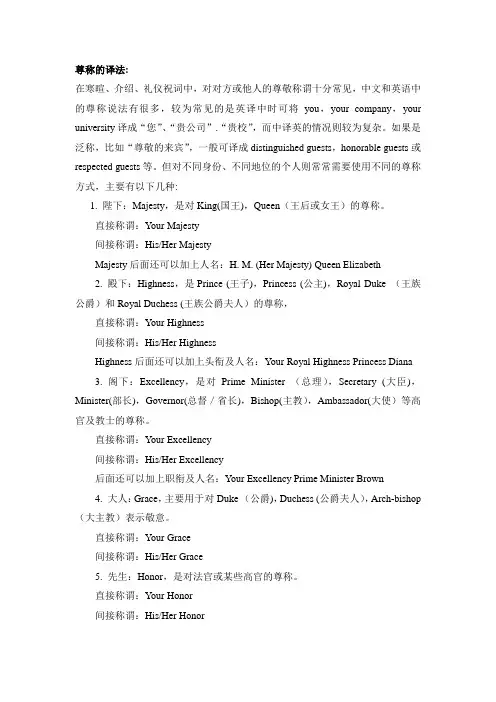
尊称的译法:在寒暄、介绍、礼仪祝词中,对对方或他人的尊敬称谓十分常见,中文和英语中的尊称说法有很多,较为常见的是英译中时可将you,your company,your university译成“您”、“贵公司”.“贵校”,而中译英的情况则较为复杂。
如果是泛称,比如“尊敬的来宾”,一般可译成distinguished guests,honorable guests或respected guests等。
但对不同身份、不同地位的个人则常常需要使用不同的尊称方式,主要有以下几种:1. 陛下:Majesty,是对King(国王),Queen(王后或女王)的尊称。
直接称谓:Your Majesty间接称谓:His/Her MajestyMajesty后面还可以加上人名:H. M. (Her Majesty) Queen Elizabeth2. 殿下:Highness,是Prince (王子),Princess (公主),Royal Duke (王族公爵)和Royal Duchess (王族公爵夫人)的尊称,直接称谓:Your Highness间接称谓:His/Her HighnessHighness后面还可以加上头衔及人名:Your Royal Highness Princess Diana3. 阁下:Excellency,是对Prime Minister (总理),Secretary (大臣),Minister(部长),Governor(总督/省长),Bishop(主教),Ambassador(大使)等高官及教士的尊称。
直接称谓:Your Excellency间接称谓:His/Her Excellency后面还可以加上职衔及人名:Your Excellency Prime Minister Brown4. 大人:Grace,主要用于对Duke (公爵),Duchess (公爵夫人),Arch-bishop (大主教)表示敬意。
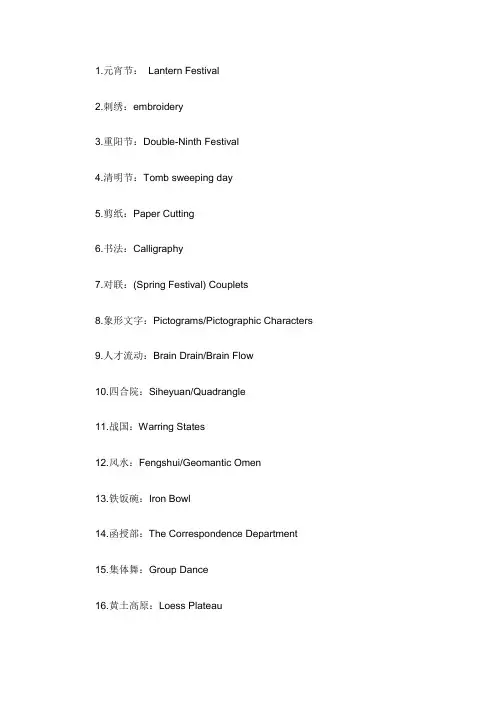
1.元宵节:Lantern Festival2.刺绣:embroidery3.重阳节:Double-Ninth Festival4.清明节:Tomb sweeping day5.剪纸:Paper Cutting6.书法:Calligraphy7.对联:(Spring Festival) Couplets8.象形文字:Pictograms/Pictographic Characters9.人才流动:Brain Drain/Brain Flow10.四合院:Siheyuan/Quadrangle11.战国:Warring States12.风水:Fengshui/Geomantic Omen13.铁饭碗:Iron Bowl14.函授部:The Correspondence Department15.集体舞:Group Dance16.黄土高原:Loess Plateau17.红白喜事:Weddings and Funerals18.中秋节:Mid-Autumn Day19.结婚证:Marriage Certificate20.儒家文化:Confucian Culture21.附属学校:Affiliated school22.古装片:Costume Drama23.武打片:Chinese Swordplay Movie24.元宵:Tangyuan/Sweet Rice Dumpling (Soup)25.一国两制:One Country, Two Systems26.火锅:Hot Pot27.四人帮:Gang of Four28.《诗经》:The Book of Songs29.素质教育:Essential-qualities-oriented Education30.《史记》:Historical Records/Records of the Grand Historian31.大跃进:Great Leap Forward (Movement)32.《西游记》:The Journey to the West33.除夕:Chinese New Year’s Eve/Eve of the Spring Festival34.针灸:Acupuncture35.唐三彩:Tri-color Pottery of the Tang Dynasty/ The Tang Tri-colored pottery36.中国特色的社会主义:Chinese-charactered Socialist/Socialist with Chinese characteristics37.偏旁:radical38.孟子:Mencius39.亭/阁:Pavilion/ Attic40.大中型国有企业:Large and Medium-sized State-owned Enterprises41.火药:gunpowder42.农历:Lunar Calendar43.印/玺:Seal/Stamp44.物质精神文明建设:The Construction of Material Civilization and Spiritual Civilization45.京剧:Beijing Opera/Peking Opera46.秦腔:Crying of Qin People/Qin Opera47.太极拳:Tai Chi48.独生子女证:The Certificate of One-child49.天坛:Altar of Heaven in Beijing50.小吃摊:Snack Bar/Snack Stand51.红双喜:Double Happiness52.政治辅导员:Political Counselor/School Counselor53.春卷:Spring Roll(s)54.莲藕:Lotus Root55.追星族:Star Struck56.故宫博物院:The Palace Museum57.相声:Cross-talk/Comic Dialogue58.下岗:Lay off/Laid off59.北京烤鸭:Beijing Roast Duck60.高等自学考试:Self-taught Examination of Higher Education61.烟花爆竹:fireworks and firecracker62.敦煌莫高窟:Mogao Caves63.电视小品:TV Sketch/TV Skit64.香港澳门同胞:Compatriots from Hong Kong and Macao65.文化大革命:Cultural Revolution66.长江中下游地区:The Mid-low Reaches of Yangtze River67.门当户对:Perfect Match/Exact Match68.《水浒》:Water Margin/Outlaws of the Marsh69.中外合资企业:Joint Ventures70.文房四宝(笔墨纸砚):"The Four Treasure of the Study" "Brush, Inkstick, Paper, and Inkstone"71.兵马俑:cotta Warriors/ Terracotta Army。
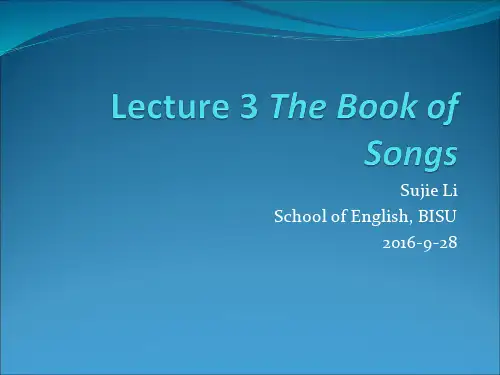
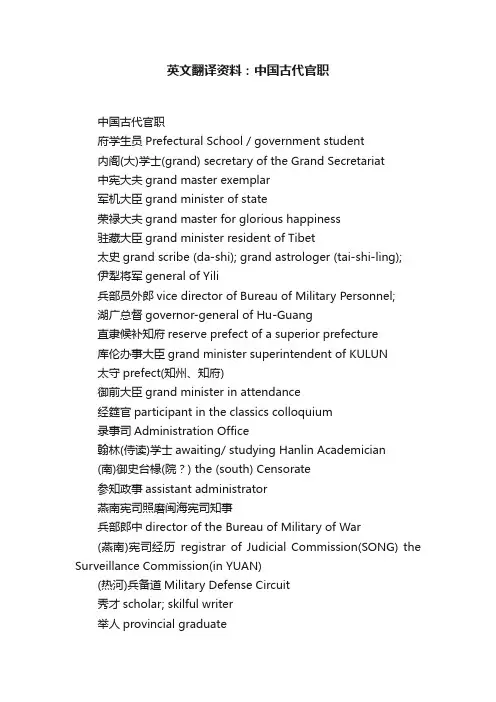
英文翻译资料:中国古代官职中国古代官职府学生员Prefectural School / government student内阁(大)学士(grand) secretary of the Grand Secretariat中宪大夫grand master exemplar军机大臣grand minister of state荣禄大夫grand master for glorious happiness驻藏大臣grand minister resident of Tibet太史grand scribe (da-shi); grand astrologer (tai-shi-ling);伊犁将军general of Yili兵部员外郎vice director of Bureau of Military Personnel;湖广总督governor-general of Hu-Guang直隶候补知府reserve prefect of a superior prefecture库伦办事大臣grand minister superintendent of KULUN太守prefect(知州、知府)御前大臣grand minister in attendance经筵官participant in the classics colloquium录事司Administration Office翰林(侍读)学士awaiting/ studying Hanlin Academician(南)御史台椽(院?) the (south) Censorate参知政事assistant administrator燕南宪司照磨闽海宪司知事兵部郎中director of the Bureau of Military of War(燕南)宪司经历registrar of Judicial Commission(SONG) the Surveillance Commission(in YUAN)(热河)兵备道Military Defense Circuit秀才scholar; skilful writer举人provincial graduate祭酒libationer; chancellor进士metropolitan graduate(燕南河北道)提刑judicial commissioner封疆大吏provincial magnate按察副使vice surveillance commissioner翻译生员translation student翰林学士Hanlin Academician理藩院court of Colonial Affairs笔帖式clerk丞相grand councilor counselor-in-chief平章政事manager of governmental affairs昭文馆大学士grand academician of the Institute for the Glorification of Literature平章军国大事manager of important national security matters 中丞事vice-manager of important national security matters 刑部尚书ministry of Justice工部尚书ministry of Works户部尚书Ministry of Revenue吏部尚书Ministry of Personnel理藩院尚书Ministry of the Court of Clonial Affairs 兵部尚书minister of war。
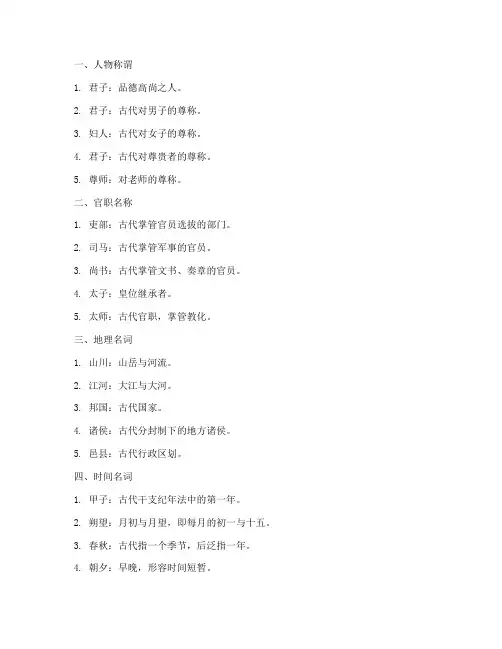
一、人物称谓1. 君子:品德高尚之人。
2. 君子:古代对男子的尊称。
3. 妇人:古代对女子的尊称。
4. 君子:古代对尊贵者的尊称。
5. 尊师:对老师的尊称。
二、官职名称1. 吏部:古代掌管官员选拔的部门。
2. 司马:古代掌管军事的官员。
3. 尚书:古代掌管文书、奏章的官员。
4. 太子:皇位继承者。
5. 太师:古代官职,掌管教化。
三、地理名词1. 山川:山岳与河流。
2. 江河:大江与大河。
3. 邦国:古代国家。
4. 诸侯:古代分封制下的地方诸侯。
5. 邑县:古代行政区划。
四、时间名词1. 甲子:古代干支纪年法中的第一年。
2. 朔望:月初与月望,即每月的初一与十五。
3. 春秋:古代指一个季节,后泛指一年。
4. 朝夕:早晚,形容时间短暂。
5. 晨昏:早晨与黄昏,形容时间。
五、事物名词1. 花草:花与草。
2. 鸟兽:鸟与兽。
3. 食饮:食物与饮料。
4. 衣裳:衣服。
5. 房舍:房屋。
六、动词1. 行:行走。
2. 闻:听到。
3. 见:看到。
4. 读:阅读。
5. 思:思考。
七、形容词1. 伟大:非常伟大。
2. 美好:美好。
3. 善良:善良。
4. 美丽:美丽。
5. 坚强:坚强。
八、连词1. 而:表示并列或递进。
2. 以:表示目的。
3. 于:表示在。
4. 为:表示成为。
5. 于:表示因为。
九、副词1. 乃:竟然。
2. 亦:也。
3. 乃:就是。
4. 谓:说。
5. 谓:认为。
十、语气词1. 哉:感叹词,表示惊讶。
2. 矣:感叹词,表示遗憾。
3. 焉:感叹词,表示疑问。
4. 哉:感叹词,表示赞叹。
5. 焉:感叹词,表示疑问。
以上为文言文高频翻译字词,学者在阅读与翻译文言文时,可结合上下文,准确理解其含义。
通过不断积累,定能提高文言文阅读与翻译水平。
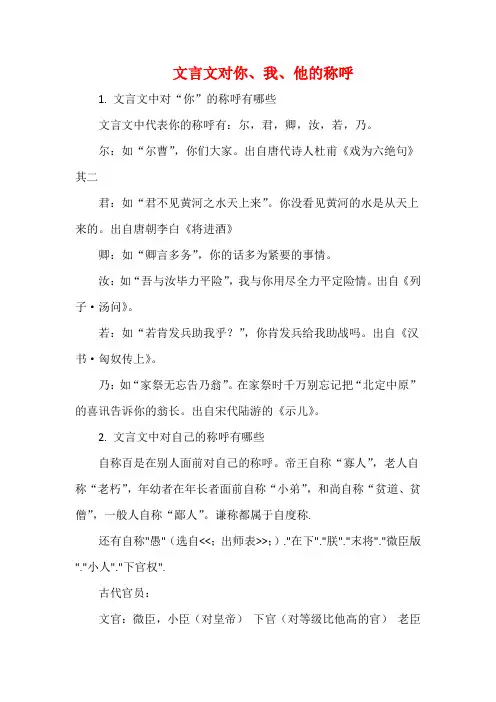
文言文对你、我、他的称呼1. 文言文中对“你”的称呼有哪些文言文中代表你的称呼有:尔,君,卿,汝,若,乃。
尔:如“尔曹”,你们大家。
出自唐代诗人杜甫《戏为六绝句》其二君:如“君不见黄河之水天上来”。
你没看见黄河的水是从天上来的。
出自唐朝李白《将进酒》卿:如“卿言多务”,你的话多为紧要的事情。
汝:如“吾与汝毕力平险”,我与你用尽全力平定险情。
出自《列子·汤问》。
若:如“若肯发兵助我乎?”,你肯发兵给我助战吗。
出自《汉书·匈奴传上》。
乃:如“家祭无忘告乃翁”。
在家祭时千万别忘记把“北定中原”的喜讯告诉你的翁长。
出自宋代陆游的《示儿》。
2. 文言文中对自己的称呼有哪些自称百是在别人面前对自己的称呼。
帝王自称“寡人”,老人自称“老朽”,年幼者在年长者面前自称“小弟”,和尚自称“贫道、贫僧”,一般人自称“鄙人”。
谦称都属于自度称.还有自称"愚"(选自<<;出师表>>;)."在下"."朕"."末将"."微臣版"."小人"."下官权".古代官员:文官:微臣,小臣(对皇帝)下官(对等级比他高的官)老臣(自己年龄大)武官:末将(对等级比他高的官)贪官,宦官:奴才,小的古代男子:小生,本公子,本少爷3. 古文对你我他的称呼古文的第一人称:朕、吾、我、予(余)、孤、寡。
朕----在先秦,一般人自称可用‘朕’。
古文的第二人称:女(汝)、尔、若、而、乃、公、君。
古文的第三人称:上古汉语没有真正的第三人称代词,而是用指示代词彼、之、其来*** 。
古文称朋友:朋、友、徒、知己。
扩展资料:尊称,也叫敬称,是对谈话对方表示尊敬的称呼,表示尊称所用的词叫做敬辞.按敬辞的词性分三种情况:(一)是直接用表敬称的代词,一般是单音节词,常用的有“汝、尔、子、而、公、君”等,这些均可译作”您.(二)是用名词来代替代词称呼对方,这种词都是双音节词,这种称呼又有三中形式:一般的尊称用“先生、吾子”等;也可用对方所在的处所或手下的人来代表对方,常用的有“足下、陛下、阁下、执事、左右”等;还有用官职身份尊称对方的,如“大王、大夫、将军、公子”等。
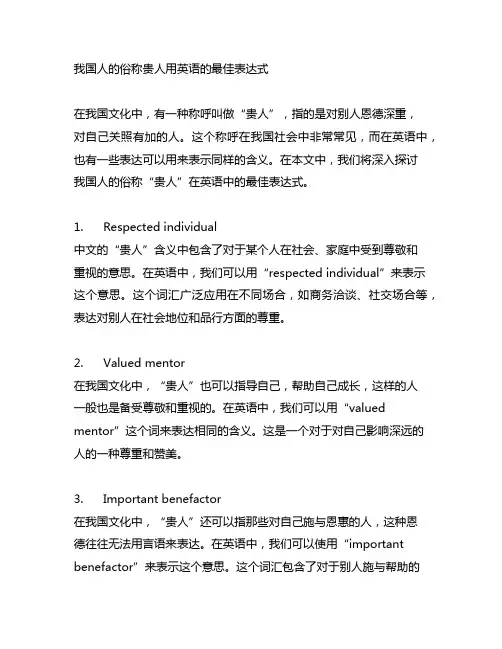
我国人的俗称贵人用英语的最佳表达式在我国文化中,有一种称呼叫做“贵人”,指的是对别人恩德深重,对自己关照有加的人。
这个称呼在我国社会中非常常见,而在英语中,也有一些表达可以用来表示同样的含义。
在本文中,我们将深入探讨我国人的俗称“贵人”在英语中的最佳表达式。
1. Respected individual中文的“贵人”含义中包含了对于某个人在社会、家庭中受到尊敬和重视的意思。
在英语中,我们可以用“respected individual”来表示这个意思。
这个词汇广泛应用在不同场合,如商务洽谈、社交场合等,表达对别人在社会地位和品行方面的尊重。
2. Valued mentor在我国文化中,“贵人”也可以指导自己,帮助自己成长,这样的人一般也是备受尊敬和重视的。
在英语中,我们可以用“valued mentor”这个词来表达相同的含义。
这是一个对于对自己影响深远的人的一种尊重和赞美。
3. Important benefactor在我国文化中,“贵人”还可以指那些对自己施与恩惠的人,这种恩德往往无法用言语来表达。
在英语中,我们可以使用“important benefactor”来表示这个意思。
这个词汇包含了对于别人施与帮助的感激和尊重,展现了对于别人恩德的认可。
总结:通过本篇文章的探讨,我们可以看到在英语中,“贵人”这个词汇可以通过“respected individual”、“valued mentor”和“important benefactor”这几种方式来进行表达。
每种表达方式都更具有深度和广度地展现了我国文化中的含义。
这些词汇不仅仅是对于别人的尊重和赞美,更是对于中文文化中的一种深刻理解和尊重。
个人观点:在中文文化中,“贵人”这个词汇承载了很多深刻的含义,涉及到对于社会和人际关系中各种不同角色的尊重和赞美。
而在英语中,“respected individual”、“valued mentor”和“important benefactor”所包含的含义也深刻而且广泛。
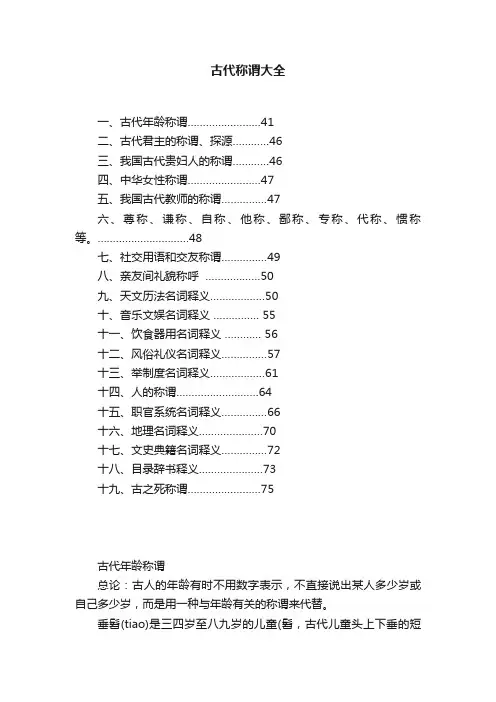
古代称谓大全一、古代年龄称谓 (41)二、古代君主的称谓、探源 (46)三、我国古代贵妇人的称谓 (46)四、中华女性称谓 (47)五、我国古代教师的称谓 (47)六、尊称、谦称、自称、他称、鄙称、专称、代称、惯称等。
(48)七、社交用语和交友称谓 (49)八、亲友间礼貌称呼 (50)九、天文历法名词释义 (50)十、音乐文娱名词释义 (55)十一、饮食器用名词释义 (56)十二、风俗礼仪名词释义 (57)十三、举制度名词释义 (61)十四、人的称谓 (64)十五、职官系统名词释义 (66)十六、地理名词释义 (70)十七、文史典籍名词释义 (72)十八、目录辞书释义 (73)十九、古之死称谓 (75)古代年龄称谓总论:古人的年龄有时不用数字表示,不直接说出某人多少岁或自己多少岁,而是用一种与年龄有关的称谓来代替。
垂髫(tiao)是三四岁至八九岁的儿童(髫,古代儿童头上下垂的短发)。
总角是八九岁至十三四岁的少年(古代儿童将头发分作左右两半,在头顶各扎成一个结,形如两个羊角,故称“总角”)。
豆蔻是十三四岁至十五六岁(豆蔻是一种初夏开花的植物,初夏还不是盛夏,比喻人还未成年,故称未成年的少年时代为“豆蔻年华”)。
束发是男子十五岁(到了十五岁,男子要把原先的总角解散,扎成一束)。
弱冠是男子二十岁(古代男子二十岁行冠礼,表示已经成人,因为还没达到壮年,故称“弱冠”)。
而立是男子三十岁(立,“立身、立志”之意)。
不惑是男子四十岁(不惑,“不迷惑、不糊涂”之意)。
知命是男子五十岁(知命,“知天命”之意)。
花甲是六十岁。
古稀是七十岁。
耄(mao)耋(die)指八九十岁。
期颐指一百岁。
具体表:不满周岁——襁褓;2~3岁——孩提;女孩7岁——髫年;男孩8岁——龆年;幼年泛称——总角;10岁以下——黄口;13~15岁——舞勺之年;15~20岁——舞象之年;12岁(女)——金钗之年;13岁(女)——豆蔻年华,15岁(女)——及笄之年;16岁(女)——破瓜年华、碧玉年华;20岁(女)——桃李年华;24岁(女)花信年华;至出嫁——梅之年;至30岁(女)——半老徐娘;20岁(男)——弱冠;30岁(男)——而立之年;40岁(男)——不惑之年、强壮之年;50岁——年逾半百、知非之年、知命之年、艾服之年、大衍之年;60岁——花甲、平头甲子、耳顺之年、杖乡之年;70岁——古稀、杖国之年、致事之年、致政之年;80岁——杖朝之年;80~90岁——耄耋之年;90岁鲐背之年;100岁——期颐。
文言文特殊称谓1、忘年交——打破年龄、辈份的差异而结为好朋友.2、忘形交——不拘形迹的缺欠或丑陋,结成不分你我的朋友.3、君子交——指道义之交,即在道义上互相支持的朋友.4、莫逆交——指彼此心意相通,无所违逆的朋友.5、刎刭交——指友谊深挚,可以同生死、共患难的朋友.6、贫贱交——贫困潦倒时结交的朋友.7、至交——友谊最深,不猜不疑的朋友.8、世交——亦称世谊、世好.指两家世代交情.9、故交——历称故旧、旧交、故人.泛指有交情的老朋友.10、一面之交——仅仅相识,但不甚了解.11、市道交——古代以做买卖手段结交的朋友,因其重利忘义,后称小人之交.12、布农之交——按习俗,普通百姓交的朋友.13、车笠之交——有钱人与没钱人结交的朋友.14、患难之交——在逆境中结交的朋友.15、酒酒之交——吃喝而结交的朋友.16、竹马之交——幼年相交的朋友.也称总角之交.17、肺腑之交——交情深厚的朋友.18、胶漆之交——亲密无间的朋友.19、生死之交——生死与共的朋友.20、邂逅之交——无意中相遇而结交的朋友.21、点头之交——交往中仅点点头打个招呼,感情不深厚的朋友.22、泛泛之交——平淡而浮泛交往的朋友.23、半面之交——见过面但不熟悉的人.24、八拜之交——旧时结拜的兄弟、姊妹的交情.25、杵臼之交——交友不嫌贫贱.26、金玉之交——宝贵而有价值的交往.【篇一:文言文特殊称谓】爱雅阁书馆欢迎您文言文中的特殊称谓(1)百姓的称谓。
常见的有布衣、黔首、黎民、生民、庶民、黎庶、苍生、黎元、氓等、草民。
(2)职业的称谓。
对一些以技艺为职业的人,称呼时常在其名前面加一个表示他的职业的字眼,让人一看就知道这人的职业身份。
如《庖丁解牛》中的“庖丁”,“丁”是名,“庖”是厨师,表明职业。
《师说》中的“师襄”和《群英会蒋干中计》中提到的“师旷”,“师”,意为乐师,表明职业。
《柳敬亭传》中的“优孟”,是指名叫“孟”的艺人。
“优”,亦称优伶、伶人,古代用以称以乐舞戏谑为职业的艺人,后亦称戏曲演员。
古代年龄称谓不满周岁----襁褓;2~3岁-----孩提;女孩7岁-----髫年;男孩8岁-----龆年;幼年泛称----总角;10岁以下----黄口;13~15岁----舞勺之年;15~20岁----舞象之年;12岁(女)---金钗之年;13岁(女)---豆蔻年华,15岁(女)---及笄之年;16岁(女)---破瓜年华、碧玉年华;20岁(女)---桃李年华;24岁(女)---花信年华;至出嫁-----梅之年;至30岁(女)--半老徐娘;20岁(男)---弱冠;30岁(男)---而立之年;40岁(男)---不惑之年、强壮之年;50岁------年逾半百、知非之年、知命之年、艾服之年、大衍之年;60岁------花甲、平头甲子、耳顺之年、杖乡之年;70岁------古稀、杖国之年、致事之年、致政之年;80岁------杖朝之年;80~90岁----耄耋之年;90岁------鲐背之年;100岁------期颐。
滕王阁序目录•• 【简介】•• 【原文】•• 【译文】•• 【写作背景】•• 【结构】•• 【评价】【简介】《滕王阁序》全称《秋日登洪府滕王阁饯别序》。
亦名《滕王阁诗序》,骈文篇名。
唐王勃作。
滕王阁在今江西省南昌市赣江滨。
唐始建,后阎伯屿为洪州牧,宴群僚于阁上,王勃省父过此,即席而作。
文中铺叙滕王阁一带形势景色和宴会盛况,抒发作者“无路请缨”的感慨。
对仗工整,言语华丽。
【原文】豫章故郡,洪都新府,星分翼轸,地接衡庐,襟三江而带五湖,控蛮荆而引瓯越。
物华天宝,龙光射斗牛之墟;人杰地灵,徐孺下陈蕃之榻。
雄州雾列,俊彩星驰,台隍枕夷夏之交,宾主尽东南之美。
都督阎公之雅望,棨戟遥临;宇文新州之懿范,襜(chān)帷暂住。
十旬休暇,胜友如云;千里逢迎,高朋满座。
腾蛟起凤,孟学士之词宗;紫电清霜,王将军之武库。
家君作宰,路出名区;童子何知,躬逢胜饯。
时维九月,序属三秋。
潦(lǎo)水尽而寒潭清,烟光凝而暮山紫。
The four great inventions of ancient china中国古代四大发明Printing 印刷术Paper making 造纸术The compass指南针Calligraphy书法The four treasure of study: brush ,ink-stick, paper, ink-stone文房四宝中国艺术Peking opera 京剧Qin opera秦腔Comic cross talk 相声Acrobatics杂技Stilt walk 踩高跷Puppet show 木偶戏Shadow play 皮影戏Opera highlight 折子戏Clay figure 泥人Ventriloquism口技Festival lantern花灯Lantern riddle 灯谜Embroidery刺绣Paper cutting剪纸Acupuncture 针灸Traditional chinese painting 中国画Chinese brush painting水墨画Chinese knot中国结中国美食Snack bar小吃摊Moon cake 月饼Rice cake年糕Deep fired dough sticks 油条Soybean milk 豆浆Steamed buns 馒头Hand-stretched noodles拉面Tofu ;bean curd 馄饨Fired rice with egg 蛋炒饭中国节日The lantern festival 元宵节The tomb-sweeping day 清明节The dragon-boat festival 端午节The mid-autumn day 中秋节The double-ninth day重阳节The double-seventh day 七夕节中国古典名著《大学》the great learning《中庸》the doctrine of the mean《论语》the analects of confucius《孟子》the mencius《孙子兵法》the art of war《三国演义》three kingdoms《西游记》journey to the west《红楼梦》dream of the red mansions《水浒传》heroes of the marshes《山海经》the classic of mountains and rivers 《资治通鉴》history as a mirror《春秋》the spring and autumn annals《史记》historical records《诗经》the book of songs《礼记》the book of rites《三字经》three-character scriptures中国旅游景点兵马俑the mausoleum of emperor大雁塔terracotta warriors and horses丝绸之路the silk road敦煌莫高窟Mogao grottoes华清池huaqing hot springs五台山jiuhua mountain。
古代称呼大全直系血亲父系曾曾祖父--曾祖父--祖父--父亲曾曾祖母--曾祖母--祖母--父亲母系曾曾外祖父--曾外祖父--外祖父--母亲曾曾外祖母--曾外祖母--外祖母--母亲儿子:夫妻间男性的第一子代。
女儿:夫妻间女性的第一子代。
孙:夫妻间的第二子代,依性别又分孙子、孙女。
有时孙子是一种不分性别的称呼。
曾孙:夫妻间的第三子代。
玄孙:夫妻间的第四子代。
旁系血亲父系伯:父亲的兄长,也称伯伯、伯父、大爷大妈:大爷的妻子叔:父亲的弟,也称叔叔、叔父婶:叔叔的妻子姑:父亲的姊妹,也称姑姑、姑母姑夫:姑姑的丈夫母系舅:母亲的兄弟,也称舅舅舅妈:舅舅的妻子姨:母亲的姐妹,也称阿姨、姨妈姨夫:姨的丈夫姻亲丈夫:结婚的女人对自己伴侣的称呼媳妇:结婚的男人对自己伴侣的称呼公公:丈夫的父亲,也直称爸爸婆婆:丈夫的母亲,也直称妈妈丈人、岳父:妻子的父亲,也直称爸爸丈母娘、岳母:妻子的母亲,也直称妈妈儿媳:对儿子的妻子的称呼女婿:对女儿的丈夫的称呼嫂子:对兄长妻子的称呼弟妹、弟媳:对弟弟妻子的称呼姐夫:对姐姐丈夫的称呼妹夫:对妹妹丈夫的称呼妯娌:兄弟的妻子间互相间的称呼或合称连襟:姐妹的丈夫间互相间的称呼或合称,也称襟兄弟大姑子:对丈夫的姐姐的称呼小姑子:对丈夫妹妹的称呼大舅子:对妻子哥哥的称呼小舅子:对妻子弟弟的称呼中国人对丈夫的称呼大全良人】古时管丈夫“良人”,这称呼好听啊,估计那时的丈夫都不泡妞,家里一杆旗帜永远飘扬,所以叫“良人”。
在当时,妻子称自己的丈夫为“良人”,但丈夫管老婆也叫“良人”,相比必当时男女比较平等的。
【郎】在“良”字旁边加个“阝”,就是“郎””;在“良”字左边加“女”,就成“娘”。
“郎”为夫君。
李白就有“郎骑竹马来,绕床弄青梅”的诗句。
“郎”多亲切的称呼阿!【郎君】但单音节词似乎太甜腻了,大约除了个别那时的“小甜甜”,如郑袖,钩弋之流,众多良家妇女们在人前还是羞于叫出口。
于是就在前头或尾后加一个字变双音词,即“郎”字后面加上一个“君”字;在“娘”字后面加上一个“子”字,成了表示亲昵的“郎君”,“娘子”。
古文称谓英译
天国:the Kingdom of Heaven/paradise
仙女:fairy maiden/female celestial
君王:king; lord
大王:Your Majesty
the chief of brigands(土匪)
丞相/宰相:prime minister; chancellor
领地:manor; territory
进谏: vt. admonish n. admonition
盛世 flourishing age/heyday
天平盛世 times of peace and prosperity; piping times of peace
盛衰兴废: prosperity and decline; rise and fall; ups and downs; vicissitudes; wax and wane
王法 the law of the land; the law
王道: kingly law, benevolent government
王位:throne
王朝: imperial court
封建王朝:feudal dynasties
王国: kingdom; realm; domain
社稷: the state/country
江山country, national territory, state power
王孙: prince’s descendants; offspring of the nobility
王府: palace of a prince
王公:princes and dukes
王公大臣: princes, dukes and ministers
公子王孙:sons of princes and nobles
公子:sons of a feudal prince or high official
王侯: princes and marquises
王侯将相:princes, nobles, generals and ministers
臣民: subjects of a feudal ruler
大臣:minister (of a monarchy)
大逆不道: treason and heresy(异端邪说); be treacherous; commit high treason; go against/violate all the heavenly laws of morality and filial love
贬官 demote an official
仕途:official career
功名利禄:high official positions and riches
金榜题名:Succeed in the government examination/ One’s name was put on the published list of successful candidates
爱戴:love and esteem
爱护:care/cherish/take good care of/treasure
拥护:support/uphold
丫鬟: servant girl; slave girl
先辈: ancestors
先烈: martyrs
仙丹: elixir of life; miracle drug
隐士: recluse; hermit
隐居:live in seclusion; withdraw from society and live in solitude; be a hermit
诸侯:the dukes or princes under an emperor; the feudal prince
诸侯争霸: The Princes vied for supremacy
独裁者:dictator; autocrat; despot; tyrant
残暴的:savage; cruel and heartless, cruel and ferocious, ruthless, brutal 残暴:ruthlessness, cruelty
暴政:tyrannical rule; tyranny/ti/; despotic rule,
暴行: savage act; act of violence; unruly conduct, outrage, atrocity 暴动:(武装叛乱)rebellion/ riot;(武装起义)uprising
暴徒:ruffian; thug; hoodlum; mobster; tearaway; bully; mob
智囊: brainpower; brain truster
谋士:adviser/advisor;counsel(l)or
智谋: resourcefulness
智谋之士: man of ideas/resourcefulness
智力:intelligence
精诚所至,金石为开:Complete sincerity can affect even metal and stone/Absolute sincerity will move a heart or stone
昏君: a fatuous(昏庸的) and self-indulgent ruler
道貌岸然:pose as a person of high morals; assume solemn airs; be sanctimonious(伪装圣洁的,伪装虔诚的); look gentlemanly, simulate solemnity
荒淫无度:excessive indulgence in lewdness; indulge in sensual pleasures ; be vicious beyond measure;
继承意志: carry on the unfinished lifework of the father[leader, etc.] ; carry out sb’s behest(s)【请求,吩咐】
嫔妃: concubine
妾: concubine
妾(指姓氏):比如Qie Liu (=surname/family name 姓) ; first name/given name名
诸子百家:all classes of authors; the hundred schools of thought; the various schools of thought and their exponents(倡导者/代表者) during the period from pre-Qin times to the early years of the Han Dynasty
法家:Legalists
道家:Taoist school; Taoists
道教:Taoism
道士: Taoist priest
儒家:the Confucian school; the Confucianists
孔子: Confucius
Confucian: adj.儒家的,儒家学说的;n.儒士,儒家学者佛家: Buddhism
佛教徒:Buddhist
门生: disciple/disaipl/; pupil
四书:The Four Books
大学:The Great Learning
中庸:The Doctrine of the Mean
论语:The Confucian Analects(论集、文选)
孟子:The Works of Mencius
五经:the Five Classics
诗经:The Book of Songs
书经:The Book of History
礼经:The Book of Rites
易经:The Book of Changes
春秋:The Spring and Autumn Annals(编年史,历史记载)
君子: gentleman; a man of noble character
圣人:saint; sage; wise man
小人: a base man; villain, vile character
地位低的人: a person of low position
气量狭窄的,目光短浅的: narrow-minded
目光短浅:be shortsighted/nearsighted
伪君子:hypocrite /hip i/
虚伪的 hypocritical /hi/;
伪善 hypocrisy /hi/。